Outdoor > Billboards: Sectors
OOH - 2
GREY, Sao Paulo / UNIVERSITY ZUMBI DOS PALMARES / 2023
Awards:
Overview
Credits
Overview
Background:
Cases of racism in businesses grew 800% between 2020 and 2022, according to the Brazilian Justice data. 251 deaths were confirmed in stores, and thousands of lawsuits were opened.
University Zumbi dos Palmares, Brazil’s only educational institution focused on the inclusion of black people, created the Racismo Zero program to fight this problem, with two courses of action: for companies, educating and training employees, and granting an "anti-racist" seal to those who have zero cases. And for consumers, serving as a reporting and emotional support channel.
One of the most frequent racist aggressions is being forced to show receipts when exiting stores to prove that they didn’t steal their own purchases.
It’s common to be followed by security guards and be forced to show receipts to avoid aggression. Not for acting suspicious, but simply for their color. The frequency and amount of these cases made the receipt a racist symbol.
Describe the Impact:
By placing billboards made with real receipts of victims of racism in front of stores where they were wrongfully accused of theft, we got support from personalities of the black community and white allies. Through social media, thousands posted photos holding receipts to pressure companies to take part on Racismo Zero, reaching 16.9M people.
As a practical effect, some of the largest companies in the country joined the program, such as P&G, Cielo (the largest payment method company), AB-INBEV and even Carrefour, a supermarket chain where many of the racism cases happened. This first wave of companies represents 320,000 employees and a chain of suppliers, distributors and business partners of approximately 8M people, who will now have anti-racist education and commitment. This generates a direct impact that changes the reality of 31.8M black consumers.
Translation. Provide a full English translation of any text.
OOH 02 HEADLINE: These are receipts that black people had to show to prove they didn’t steal what they bought.
SUPPORT TEXT: Companies, join Racismo Zero and help to change this reality.
Is there any cultural context that would help the jury understand how this work was perceived by people in the country where it ran?
The legacy of 300 years of slavery in Brazil created structural racism. That explains the 40% lower average income among black people, why they account for 78% of deaths by firearms, and why we have four black people among the CEOs of the 500 largest companies.
Structural racism is also in retail. 70% of black consumers have already suffered aggression in a country where they represent 55% of the population.
One of the most common cases is when they are forced to show receipts of what they bought to prove that they didn’t steal it.
Because they are not white, they are constantly accused of theft by the stores’ employees, which turns the receipt into proof of their innocence.
By creating billboards made with real receipts of victims of this type of racism, we pressured companies to join Racismo Zero and change this reality in their stores.
More Entries from Consumer Services / Business to Business in Outdoor
24 items
More Entries from GREY
24 items






